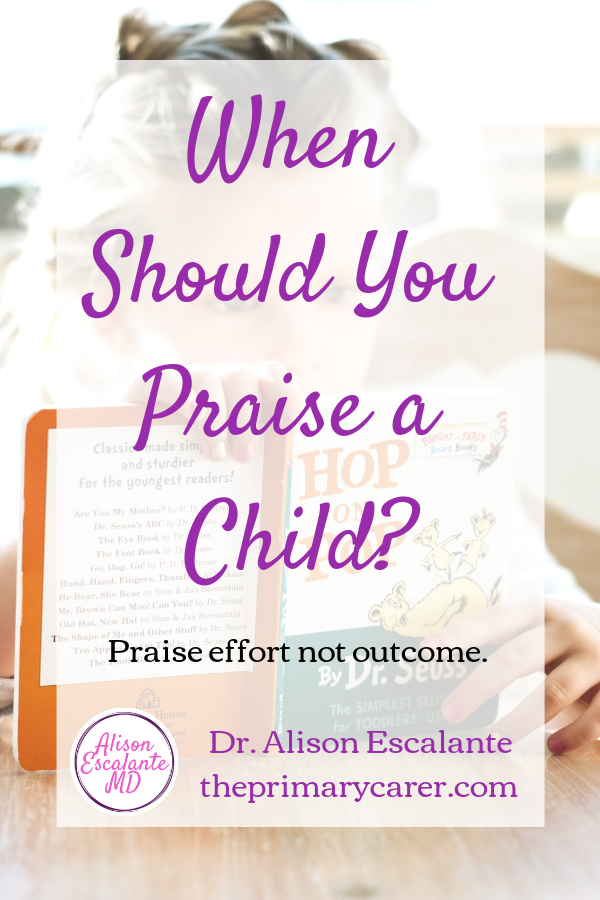Today’s question was sent in by Joy. “When should I praise my child?” She asks. She’s worried that she’s not praising her kids enough. She thinks that if she doesn’t they will feel insecure about themselves, and maybe have more bad behavior.
When I look at this from the viewpoint of the Should-Free Parenting Project, and work to find effective parenting solutions without being crushed by the culture of criticism, I find myself rephrasing her question. Instead of “When should I praise my child?” I would ask, “How is it best to praise a child?”
How is it best to praise a child? Don’t praise attributes.
Research shows some interesting things about praise. Praise can help build our kids up, or it can actually make them anxious and insecure. It all depends on how we do it, or rather, what we praise.
If we praise attributes, we say things like: You’re so smart, you’re so beautiful. Or you’re the best soccer player in the world, you are the best artist in your school. When we praise them like this, our kids eventually stop believing us because they start to think it might not be true.
When they notice their mistakes, they think that means that they’re not smart. Eventually, they realize they are not the best soccer player on their team, or in their league, they start to feel they are not a good soccer player at all. They feel like a fraud, as if they have to be the best or it doesn’t matter.
Our intention was to encourage them, but we’ve actually made them less confident. This often sets in by about age 12 if it doesn’t happen sooner.
How is it best to praise a child? Praise Effort.
In contrast, if we praise efforts we do help build our kids’ confidence, and their willingness to work hard in the face of mistakes. So for instance, instead of saying to my son, you’re so smart, when he does his math homework, it would be more helpful for me to say, “Hey, I really noticed the effort you put in there, you really worked hard on your math today.”
I might also say, “I also noticed you came right in and sat down and did it. And that was very responsible.” With that kind of praise for efforts, I reinforced a really good behavior, his responsibility, and I praised his effort.
If I had said, “You’re so smart,” and then when we got to the problem he got wrong, he might be more resistant to discussing it, because it’s proof that it maybe he’s not as smart as mommy said. But when I say, “You worked really hard,” the message is that it’s hard work that matters.
When we get to the problem he got wrong, it may not feel good to look at it. Now, I can say something like, “Hey, you’re so good at working hard at figuring things out. Do you want to take another look at this one?” Because the behavior that’s valued is going for it, he’s going to be more likely to do that.

So when should I praise my child? Whenever my child is trying. What should I praise? Praise effort, not attributes. Offer praise for things your child can work on, not things they can’t change about themselves.
Am I praising my child enough?
Is Joy really sharing a concern less about praise, and more because things have taken on a negative tone lately in her home? She did not say that this was going on, but it’s worth talking about because I think we’ve all been there. I’ve been through this many times with my kids. I feel so bad about it when I’ve taken on a negative or critical stance. We’ve all heard things like “for every time you correct your child make sure to say 5 good things.”
That particular advice has always made me feel exhausted and overwhelmed. I feel like I can’t measure up. That’s because when I try to add up how many times I praised, I feel concerned. It’s probably a lot more productive to drop worries about numbers and focus on authentic moments with our kids.
Are you really praising as little as you think? If praise is for effort, and often involves just noticing what our kids are doing with our words. So if we use the 3S method, we can engage authentically with our kids to build their confidence.

SIGH, take that deep breath into your body and let it out long and slow. Then SEE. Really see how you are doing. See your child, see the situation. See when you are praising. See how you’re using praise. See if you’re using praise in a manipulative way, because that usually doesn’t work.
And then START. Start praising effort. Start praising wisely, and start praising carefully, because if you praise all the time, your kids stop listening to it, and they stop believing it. In fact, kids often notice their accomplishments better if we wait a second. When they notice it themselves, they internalize it and they say, “Wow, I really did that.”
Learn More!
To learn the 3S Method, watch my TEDx Talk. If you want to know more about Should-Free parenting which is all about getting parents back in the driver’s seat that have been taken over by the culture of criticism join us on Facebook where we have a really fun group of parents.

©Alison Escalante MD
Disclaimer: This article represents general education and does not constitute medical advice. My ideas are mine alone.


Greetings! Very useful advice within this post!
It’s the little changes that will make the greatest changes.
Thanks a lot for sharing! dildok3